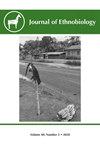实时地图与全球定位系统设备在混合方法工具包研究社会和环境变化
IF 1.3
3区 社会学
Q1 ANTHROPOLOGY
引用次数: 0
摘要
为了探索人们发展社会生态变化知识的过程,本文描述了一个混合方法工具包,其中包含一种在风景中实时绘制地图的技术。该工具包的定量组成部分基于民族生物学家对基于地点的社区的嵌入,并利用全球定位系统(GPS)的力量。随着使用GPS的民族生物学家通过与他们的研究合作者一起在风景中移动来参与地图绘制,我们可以使用手持设备,同时与外层空间的卫星通信,实时绘制地图。在现有的大量民族生物学方法中,使用手持GPS设备可以与其他类型的数据收集技术相结合,以加强对人类景观中相互作用的研究。此外,地图绘制实现了运动追踪,这是一种解释时空文化和记录社会生态变化的基础经验的策略。通过汇集对民族生物学和定性地理信息系统(GIS)学科的兴趣,本文描述了一些方法,这些方法使人们能够解释时空文化,这种文化引导人们在家乡旅行,并在他们努力整合和指导不断变化的生活环境时交流他们的经历。本文章由计算机程序翻译,如有差异,请以英文原文为准。
Real-Time Mapping With Global Positioning Systems Devices in a Mixed Methods Toolkit for Studying Social and Environmental Change
To explore the process through which people develop knowledge about socioecological change, this article describes a mixed-methods toolkit containing a technique for making maps in real time while moving through landscapes. The quantitative component of the toolkit is grounded in ethnobiologists’ embeddedness in place-based communities and harnesses the power of global positioning systems (GPS). As GPS-wielding ethnobiologists engage in participatory mapping by moving through landscapes with their research collaborators, we can use handheld devices and simultaneously communicate with satellites in outer space to produce maps in real time. Within the existing, large inventory of ethnobiological methods, using handheld GPS devices can be combined with other types of data-collecting techniques to enhance studies of interactions in more-than-human landscapes. Moreover, mapmaking implements movement trace, a tactic for interpreting space-time cultures and documenting grounded experiences with socioecological change. By bringing together interests in the disciplines of ethnobiology and qualitative geographic information systems (GIS), this article describes methods that make it possible to explain the space-time culture that guides people to move through their homelands and to communicate about their experiences even as they work toward integrating and directing the changing circumstances of their lives.
求助全文
通过发布文献求助,成功后即可免费获取论文全文。
去求助
来源期刊

Journal of Ethnobiology
Social Sciences-Anthropology
CiteScore
4.80
自引率
3.40%
发文量
21
审稿时长
>12 weeks
期刊介绍:
JoE’s readership is as wide and diverse as ethnobiology itself, with readers spanning from both the natural and social sciences. Not surprisingly, a glance at the papers published in the Journal reveals the depth and breadth of topics, extending from studies in archaeology and the origins of agriculture, to folk classification systems, to food composition, plants, birds, mammals, fungi and everything in between.
Research areas published in JoE include but are not limited to neo- and paleo-ethnobiology, zooarchaeology, ethnobotany, ethnozoology, ethnopharmacology, ethnoecology, linguistic ethnobiology, human paleoecology, and many other related fields of study within anthropology and biology, such as taxonomy, conservation biology, ethnography, political ecology, and cognitive and cultural anthropology.
JoE does not limit itself to a single perspective, approach or discipline, but seeks to represent the full spectrum and wide diversity of the field of ethnobiology, including cognitive, symbolic, linguistic, ecological, and economic aspects of human interactions with our living world. Articles that significantly advance ethnobiological theory and/or methodology are particularly welcome, as well as studies bridging across disciplines and knowledge systems. JoE does not publish uncontextualized data such as species lists; appropriate submissions must elaborate on the ethnobiological context of findings.
 求助内容:
求助内容: 应助结果提醒方式:
应助结果提醒方式:


